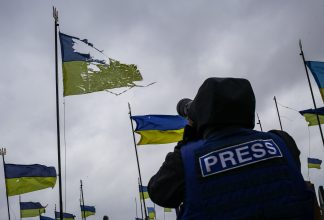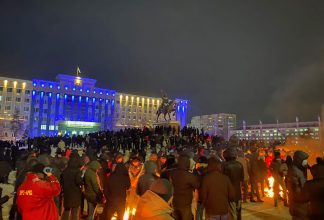Russia: First Time a Human Rights Defender Risks Prison Under the “Foreign Agents” Law
The last several weeks have seen a marked deterioration in the human rights situation in Russia, including the first criminal case brought under the widely-criticised “foreign agents” law, the passage of anti-terrorist legislation that severely curtails existing human rights protections, and a federal law calling for preventive measures against Russians exhibiting ‘anti-social’ behaviour that does not attempt to define the term. The most recent legislation has yet to be signed into law by President Vladimir Putin, but it is part of an increasingly worrying trend that has alarmed observers both in and outside Russia.
On 22 June, Russian authorities opened a criminal case against Valentina Cherevatenko, director of the non-governmental organisation (NGO) “Women of the Don”. Cherevatenko is accused of failing to comply with the controversial 2012 law requiring all NGOs receiving foreign funding or engaging in loosely defined “political activity” to register as a “foreign agent” with the state. It is the first time the authorities have used the statute to bring criminal charges, as all previous alleged violations have been dealt with as administrative cases. Cherevatenko can be sentenced for up to 2 years in prison if found guilty.
“We are deeply concerned that Russian authorities have opened a case against Valentina Cherevatenko and we urge the authorities to drop all charges against her. The “foreign agents” law violates Russia’s international human rights obligations. We urge the EU to call on Russia to repeal or amend all laws and regulations that are not complying with international human rights standards,” said Joanna Kurosz, Programme Director for Eurasia, Civil Rights Defenders.
Civil Rights Defenders, among several other organisations, has previously urged Russian authorities not to open a criminal case against Cherevatenko.
“To open a criminal case against Valentina Cherevatenko is a criminal persecution, it is pressure from the government due to her professional activity, unfounded and disproportionate interference in the operation of her civil society organisation, which is absolutely unacceptable. This is an obvious violation of Russia’s international human rights obligations, and these actions are establishing a dangerous new precedent for criminalization of peaceful and legitimate human rights activity,” said Natalia Taubina, director of Public Verdict, a Russian human rights organisation.
A couple of days after the case was opened, on 24 June, the State Duma also approved amendments to the Criminal Code on counteracting terrorism and extremism in the name of protecting public safety. The amendments permit police and the Federal Security Service (FSB) to access telecommunication companies’ data without a judicial review if they believe “sufficient data exists” that a person is engaging in illegal activities.
“This amendment runs against the Constitution which states that secrecy of correspondence may be violated only after a court decision. However, if the law is adopted it will take years for the Constitutional court or European court of human rights to repeal it,” said Marina Agaltsova, attorney at Memorial Human Rights Center.
The amendments infringe on several human rights, most notably the freedom of expression. Authorities argue the amendments were introduced to prevent terrorism, but activists believe their loose definition of ‘terrorism’ means they are instead designed as a tool to pressure civil society. Many of the amendments call for strong penalties and lengthy prison sentences for ill-defined crimes; for example, “inducing, recruiting, or otherwise involving” others in the organisation of “mass unrest” is now punishable by up to 10 years in prison.
“It is an attempt to silence criticism with a disproportionally strict punishment. For example, activists who find information about the personal lives of public figures will be frightened to reveal and share this information,” said Marina Agaltsova.
On 23 June, the State Duma passed a law allowing police to take anyone suspected of “anti-social behaviour” or “violations of socially accepted norms of morality” into preventive custody. Tatyana Vinnichenko, the chair of the Russian LGBT Network, suspects the law is part of an increasing trend of harassment of Russia’s LGBT population and could be used to create local registries of LGBT people.
“This legislation refers us back to the times of USSR when the police used similar methods. It repeats the politics of harassment, creates a ‘second class citizens’ database, and will result in a new wave of aggression and crime from the authorities against LGBT people,” said Vinnichenko.
“We are deeply concerned about the decline in legal protection of Russian citizen’s human rights and repression of human rights defenders. We urge Russian authorities to stop their persecution and harassment of Russian citizens and we call upon President Putin not to sign the recently passed repressive legislation into law,” said Joanna Kurosz.


